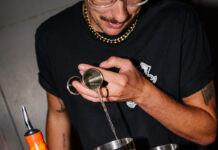A well maintained cellar is the key to good beer
WITH customers seemingly more open-minded to trying new beers than ever before, many pubs and bars have been expanding their draught ranges to include a wider selection of brewers and beer styles.

But regardless of how many brands are on the bar, it will always be the quality of the drinks that remains paramount.
So before operators consider expanding their draught offer, good quality beer lines and a well-run cellar should be prioritised.
That was the view taken by various dispense experts, who stressed that a well maintained cellar is crucial to the best quality beer.
Mark Fewster, product manager of dispense specialist Vianet, told SLTN that the cellar “is undoubtedly the engine room of the pub but, conversely, is usually the place that gets the least investment”.
“Often you find ageing equipment and poor insulation, meaning temperatures are tough to control and maintenance becomes a real issue,” said Fewster.
Lawson Mountstevens, managing director of pubco Star Pubs & Bars, said that “serving a perfect pint is so important to a pub’s offer”.
“A well-run cellar is central to running a great pub as customers will vote with their feet if a pub fails to serve quality beer and cider,” he said.
Echoing this view was Simon Heath, cellar quality manager at brewer Charles Wells, which counts McEwan’s within its stable of brands. He said that “all aspects of the ‘grain to glass’ journey should always remain high on the list of priorities”.
But with customers expecting more choice on tap, Heath reckons operators who extend their range – but fail to put a sensible cellar management plan in place – could be doing more harm than good.
He said a wide range of choice “can lead to poor rate of sale, and that’s bad news for beer quality and the consumer experience”.
“Reputation is driven by excellence, and poor reputations see licensees struggle commercially,” said Heath.
Customers will vote with their feet if a pub fails to serve quality beer.
Therefore, there are some key tips that operators should keep in mind when it comes to beer quality, according to Steve Lakin of Innserve.
Firstly, he reckons that “beer deserves the same level of care as food”.
“Cleanliness is vitally important, both in terms of glassware and beer lines and other equipment,” he said.
“While debate continues on the frequency of line cleaning, for most outlets this task should be scheduled to be carried out every seven days, and include not only beer lines but equipment such as nozzles and keg connectors.”
And new technology, such as devices that induce an electromagnetic field to prevent the build up of scale and bio film as well as bacterial growth, can be purchased to help extend the time between line cleans; Lakin reckons this could save the typical outlet between £1000 and £1500 a year.
Consistency is key, according to Steven Trezona of specialist line cleaning firm Clear Brew.
He said that “line cleaning is all about maintaining quality and not about cleaning lines because they are dirty”.
Temperature is also an important consideration.
Trezona said a cellar temperature between 11 and 13 degrees “should remain constant”.
“With around one in ten pubs estimated to still be serving beer considered to be too warm, successful licensees will ensure that their cellar is kept at just the right temperature,” he said.
And staff training mustn’t be ignored.
Heath, of Charles Wells, said: “Run regular ‘perfect serve’ training, get your supplier to advise and support.
“You’re never too old to learn.”



















